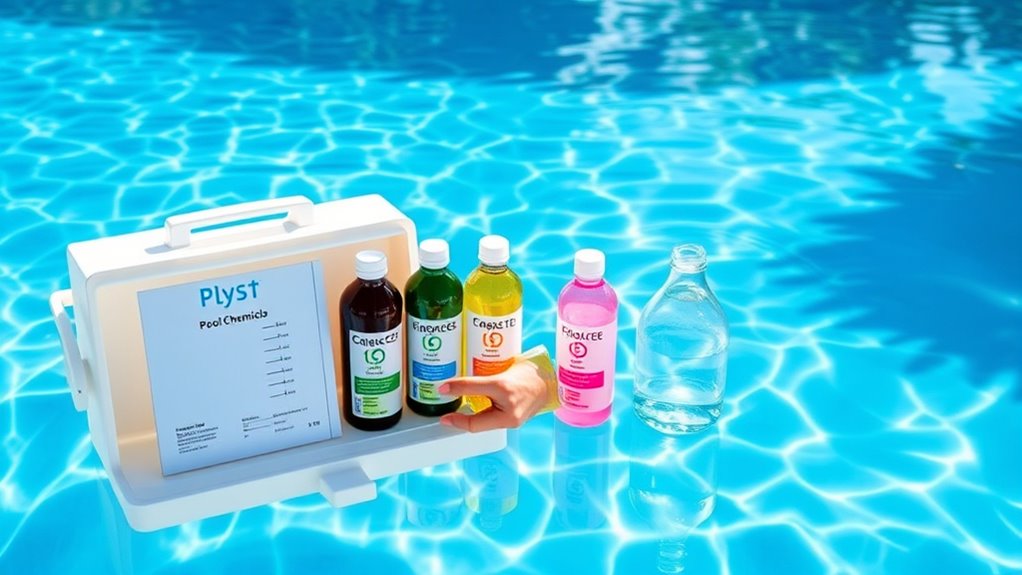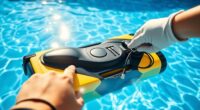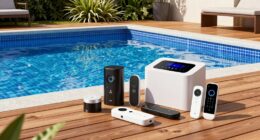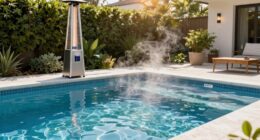Stop relying only on chlorine tablets and neglecting regular water testing. Instead, you should test your water weekly to monitor pH, chlorine, and other chemical levels, adjusting them promptly. Avoid overusing algaecides and clarifiers, and never mix chemicals without proper knowledge. Also, maintain your filtration system and address chemical imbalances early. Keep these practices in mind, and you’ll discover simple ways to keep your pool safe and crystal clear—that’s just the start.
Key Takeaways
- Avoid overusing chlorine tablets without testing; instead, regularly monitor water chemistry and adjust chemical levels accordingly.
- Don’t rely solely on algaecides and clarifiers; focus on proper testing and natural filtration methods to maintain balance.
- Never mix chemicals haphazardly; always follow manufacturer instructions and wear protective gear for safe handling.
- Stop neglecting pH adjustments; regularly test and correct pH to ensure sanitizer effectiveness and water clarity.
- Don’t skip routine filter maintenance; clean and inspect filters often to support proper water circulation and chemical balance.
Relying Solely on Chlorine Tablets
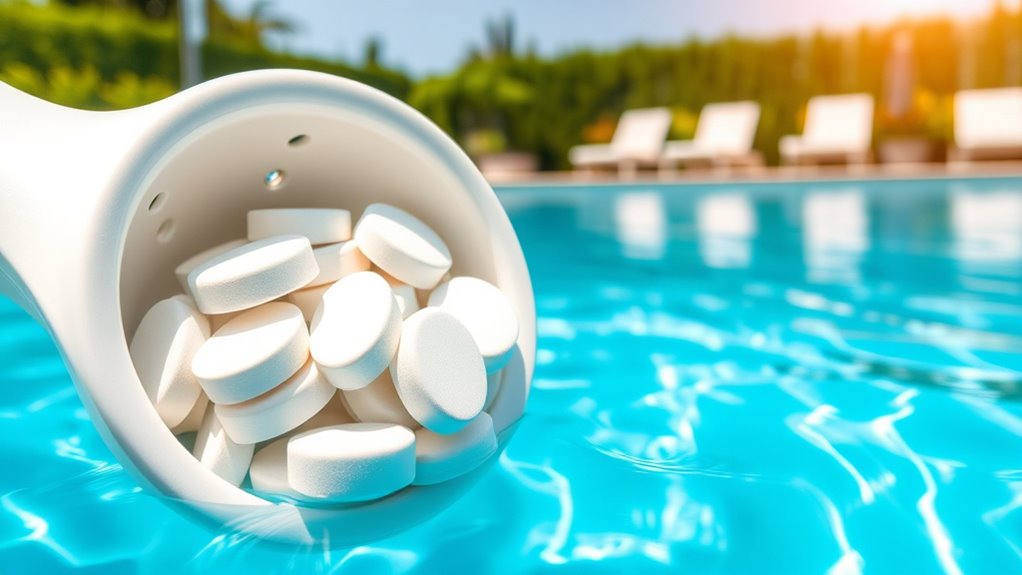
While chlorine tablets are a popular choice for maintaining pool sanitation, relying solely on them can lead to imbalanced water chemistry. Overusing tablets often causes chemical overload, which can harm your pool’s equipment and irritate your skin and eyes. Additionally, this approach tends to cause pH neglect, as the consistent release of chlorine can lower pH levels without proper adjustments. When pH drops too low, chlorine becomes less effective, and algae or bacteria may thrive. To keep your water balanced, don’t depend only on tablets. Regular testing helps you monitor chemical levels and adjust pH and sanitizer amounts accordingly. Using a thorough approach ensures your pool stays clean, safe, and comfortable without risking chemical imbalances. Incorporating proper chemical management practices, including balancing pH and sanitizer levels, is essential for maintaining optimal pool water quality.
Ignoring Regular Testing and Monitoring
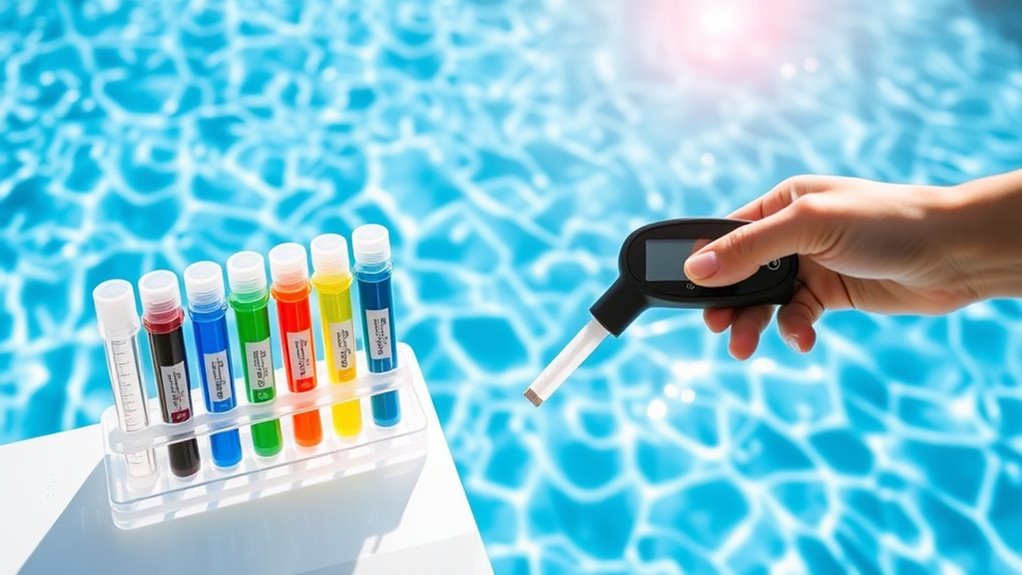
Relying solely on chemical inputs like chlorine tablets can give a false sense of security about your pool’s health. Without regular water testing and monitoring, you can’t accurately gauge chemical stability or detect imbalances early. Skipping routine testing means you may not catch rising pH levels, algae growth, or other issues before they become serious. Inconsistent testing leads to guesswork, which can result in over- or under-application of chemicals, jeopardizing water clarity and swimmer safety. To keep your pool safe and inviting, schedule regular water tests—at least once a week—and adjust chemicals accordingly. Monitoring helps maintain proper chemical balance, prevents corrosion or scaling, and ensures your water stays clean and clear. Incorporating water testing as part of your routine can significantly improve your pool maintenance results. Don’t neglect water testing; it’s essential for proper chemical stability management.
Overusing Algaecides and Clarifiers
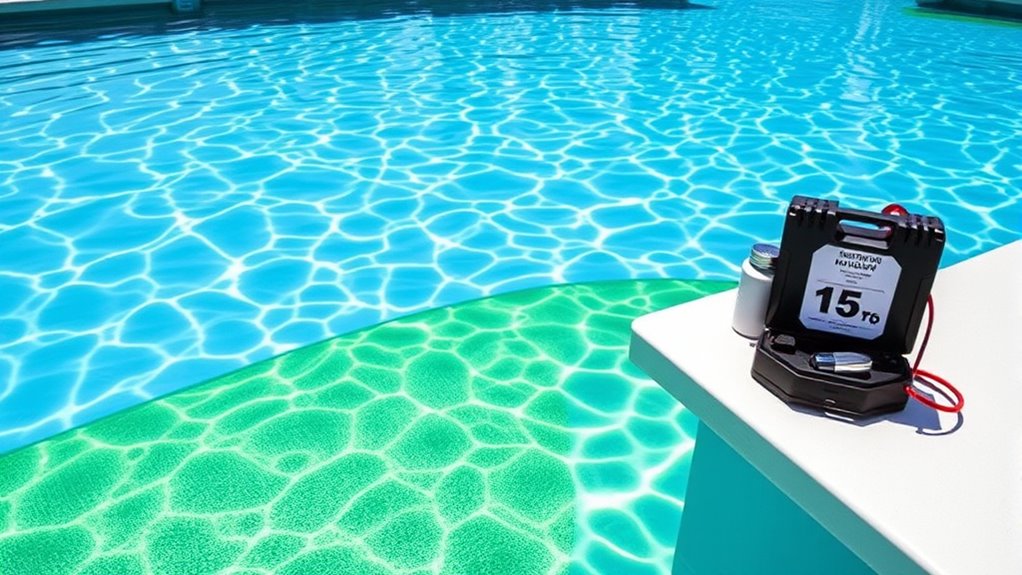
Using too much algaecide or clarifier can lead to unnecessary chemical buildup in your pool. This often results from adding these products without testing or understanding your water’s actual needs. Instead, focusing on maintaining proper water balance naturally reduces the need for excess chemicals.
Unnecessary Chemical Additions
Sometimes, pool owners add extra algaecides or clarifiers unnecessarily, thinking it will improve water quality. This chemical overuse often stems from a misconception that more products mean cleaner water. But in reality, unnecessary additives can upset your pool’s chemical balance and lead to cloudy or imbalanced water. Overusing algaecides or clarifiers doesn’t make your pool safer or cleaner; it just wastes money and can cause long-term issues. Instead, focus on proper testing and dosing of the essential chemicals, and trust that your pool’s natural filtration and regular maintenance will keep the water clear. Avoid the trap of defaulting to additional chemicals—stick to a balanced, deliberate approach to pool care, and your water will stay sparkling without excess additives. Proper chemical management is crucial for maintaining a safe and healthy swimming environment, and relying on vetted practices ensures long-term water quality.
Balance Water Naturally
Overusing algaecides and clarifiers can do more harm than good, disrupting your pool’s natural balance. Instead, focus on eco-friendly methods that support a healthy, balanced water environment. Maintaining a natural balance means regularly monitoring pH levels, ensuring proper filtration, and encouraging beneficial bacteria that naturally break down contaminants. Avoid relying heavily on chemical additives; these can upset the delicate equilibrium and lead to more issues down the line. Incorporating natural methods like aeration, proper circulation, and using mineral-based products can help keep your water clear and balanced without synthetic chemicals. By prioritizing eco-friendly approaches, you reduce chemical overuse and promote a safer, healthier pool that stays balanced with less intervention. Understanding the role of Gold IRA investments can also help diversify your financial portfolio and safeguard your assets over time.
Mixing Chemicals Without Proper Knowledge
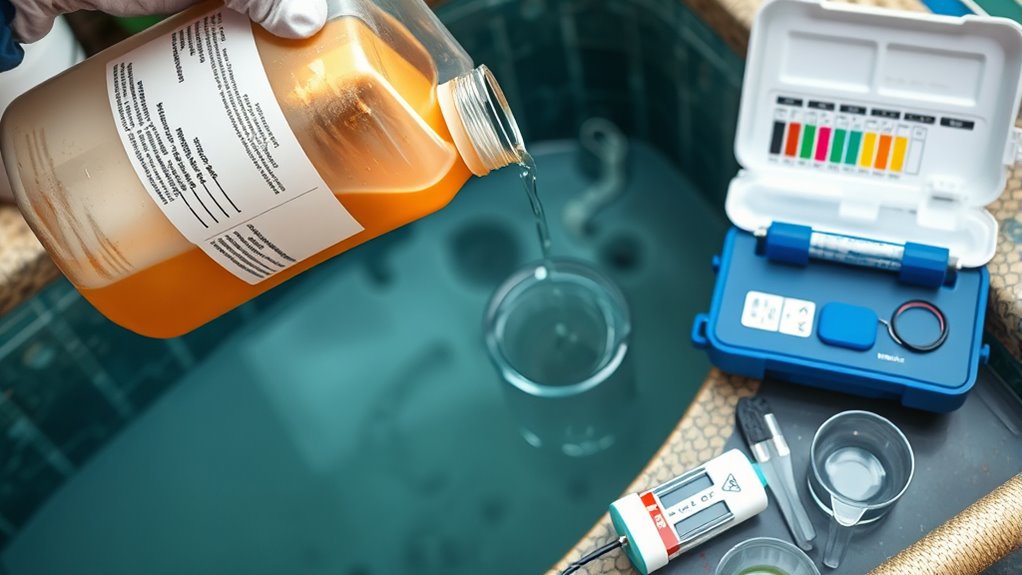
Mixing pool chemicals without proper knowledge can be dangerous and lead to serious safety hazards. You need to prioritize chemical safety and understand how different chemicals interact before combining them. Improper handling can cause dangerous reactions, such as toxic fumes, fires, or chemical burns. Always read labels carefully and follow manufacturer instructions. Never mix chlorine with acids or other chemicals unless specified, as this can produce harmful gases. Use protective gear like gloves and goggles when handling chemicals. If you’re unsure about how to mix or add chemicals, consult a professional or reference reliable sources. Remember, mistakes in chemical handling can jeopardize your safety and ruin your pool. Taking the time to learn proper handling techniques keeps you safe and ensures effective pool maintenance. For example, understanding chemical interactions helps prevent accidental dangerous reactions.
Skipping the Ph Adjustment Step
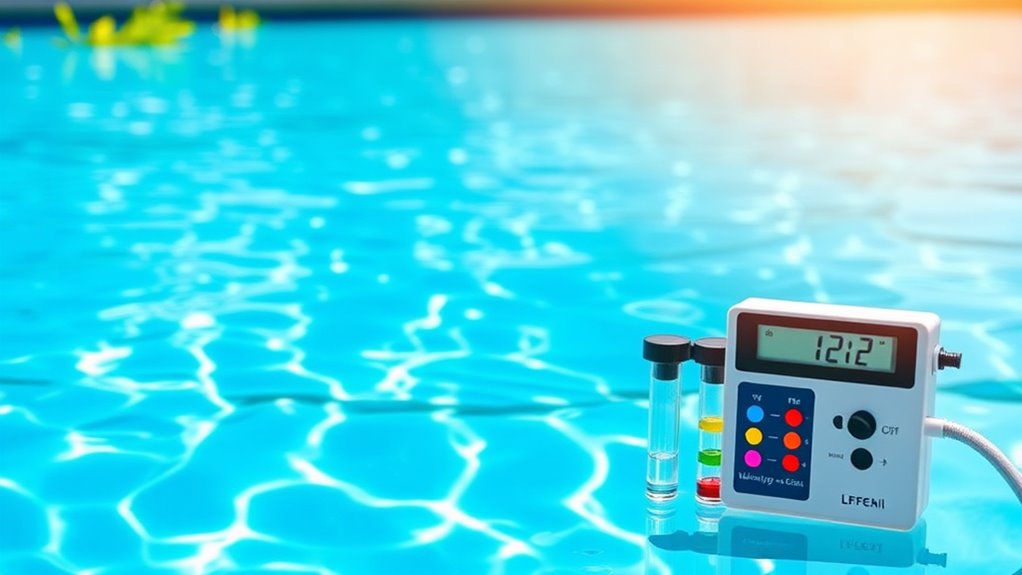
Skipping the pH adjustment step can undermine your entire pool maintenance routine. When you neglect to balance the pH, you’re risking a pH imbalance that can lead to cloudy water, algae growth, and corrosion of your equipment. This oversight often happens because it’s easy to overlook, but it’s critical for overall water quality. Without proper pH levels, chlorine becomes less effective, making your sanitizer work harder without the desired results. Regularly testing and adjusting your pH ensures your chemicals work as intended and protects your pool’s surfaces. Proper pH adjustment is essential for maintaining a safe, clean, and balanced pool. Proper pH adjustment saves time, money, and headaches down the line.
Neglecting Filtration System Maintenance
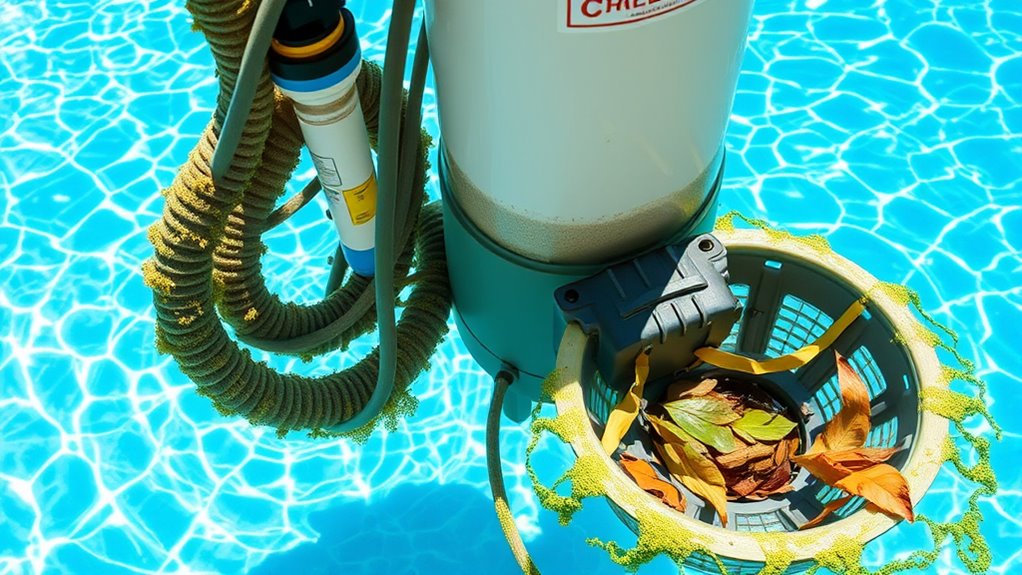
Neglecting your filtration system can lead to cloudy water and imbalanced chemicals. You need to check your filter regularly to guarantee it’s working properly. Don’t forget to clean the filter often to keep your pool water clean and clear. Incorporating regular maintenance routines can help ensure your filtration system operates efficiently and extends its lifespan.
Regular Filter Checks
Regular filter checks are essential for maintaining a healthy pool, but many pool owners overlook this important step. When filters aren’t checked regularly, debris can clog the system, hindering pool circulation and affecting chemical balance. A well-maintained filter ensures proper water flow, which helps distribute chemicals evenly and improves overall water quality. Neglecting filter maintenance can lead to poor filtration, algae growth, and costly repairs. Use the table below to keep your filter in top shape:
| Check Frequency | Tasks |
|---|---|
| Weekly | Inspect and clean filter |
| Monthly | Backwash or replace media |
| Quarterly | Professional system check |
Prioritize regular filter checks to keep your pool safe, clean, and chemically balanced. Ensuring your filtration system operates correctly is also vital for water quality, preventing issues before they become costly problems.
Clean Filter Regularly
Cleaning your filter regularly is essential for maintaining a balanced and healthy pool. Proper filter maintenance ensures debris removal, keeps water clear, and prevents equipment strain. If you neglect this step, your pool’s filtration efficiency drops, leading to cloudy water and chemical imbalance. To keep your system in top shape, check and clean your filter often.
Consider these tips:
- Remove debris from the filter basket and cartridges routinely
- Backwash or clean the filter media as recommended by the manufacturer
- Inspect for damage or wear that could hinder debris removal
- Regular filter maintenance aligns with Ford Tuning principles of optimizing system performance and longevity
Regular cleaning minimizes buildup, extends your filter’s lifespan, and maintains peak water quality. Staying on top of filter maintenance helps you avoid costly repairs and keeps your pool sparkling clean.
Waiting Too Long to Address Chemical Imbalances
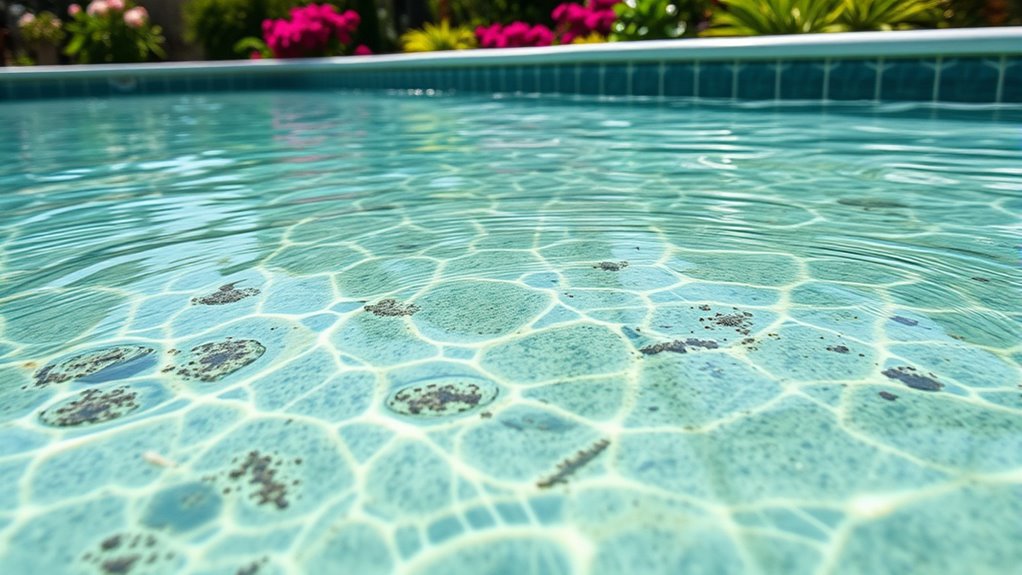
When you delay addressing chemical imbalances in your pool, small issues can quickly escalate into bigger problems. Timing delays often lead to algae growth, cloudy water, and increased bacteria, making your pool unsafe and unpleasant. Chemical neglect allows pH, alkalinity, and sanitizer levels to drift out of balance, which can cause corrosion or scaling. The longer you wait, the harder it becomes to restore proper water chemistry. Routine testing and prompt adjustments are vital to prevent costly repairs and ensure safe swimming conditions. Don’t overlook small changes—treat imbalances immediately to keep your pool clean and healthy. Acting quickly minimizes the impact of chemical imbalances, saving you time, money, and frustration in the long run.
Frequently Asked Questions
How Often Should I Test My Pool Water?
You should test your pool water at least twice a week for ideal pool maintenance. Regular chemical testing helps you keep the balance right, preventing issues like algae growth or cloudy water. During peak swimming season, test more frequently, especially after heavy use or rain. Use a reliable test kit to monitor pH, chlorine, and stabilizer levels, ensuring your pool stays clean and safe for swimmers.
What Are the Signs of Chemical Imbalance?
Imagine your pool as a delicate dance where pool pH and chlorine levels lead. If your water turns cloudy, feels slimy, or has a strong chemical smell, it’s a sign of imbalance. Low chlorine allows bacteria to thrive, while high pH can cause algae growth. Keep an eye on these signs, test regularly, and adjust your chemicals promptly to keep your pool safe and sparkling.
Can I Use Household Products to Adjust Pool Chemicals?
You shouldn’t use household products to adjust your pool chemicals. DIY fixes and chemical shortcuts may seem easy, but they can throw off the balance, leading to unsafe or cloudy water. Instead, stick to proper pool chemicals like chlorine and pH adjusters, following manufacturer instructions. This guarantees safe, effective balancing and prevents damage to your pool and equipment. Always prioritize proper chemical management over quick, untested solutions.
How Do I Properly Store Pool Chemicals?
Imagine a fortress guarding precious treasures—that’s how you should view pool storage. Keep chemicals in a cool, dry, well-ventilated space, away from sunlight and humidity. Store them in original, clearly labeled containers, never mixing different chemicals. Prioritize chemical safety by securing lids tightly and keeping flammable items away. Proper pool storage protects your loved ones and preserves chemical effectiveness, ensuring your pool remains safe and sparkling all season long.
What Are the Risks of Overusing Algaecides?
Overusing algaecides can lead to buildup, which may clog your filter and reduce water clarity. It also creates chemical dependency, meaning your pool might rely heavily on algaecides instead of proper sanitation. This can increase chemical costs and potentially cause skin or eye irritation. To avoid these risks, use algaecides as directed, maintain proper water balance, and regularly test your water to keep algae at bay naturally.
Conclusion
By focusing too much on chlorine tablets and neglecting regular testing, you might think you’re maintaining your pool. Coincidentally, neglecting filtration and chemical balance often leads to surprises—algae blooms or cloudy water. Remember, a well-balanced pool isn’t just about chemicals; it’s about consistent monitoring and maintenance. When you pay attention to these details, you create a safe, inviting space—sometimes, the smallest adjustments make the biggest difference.
